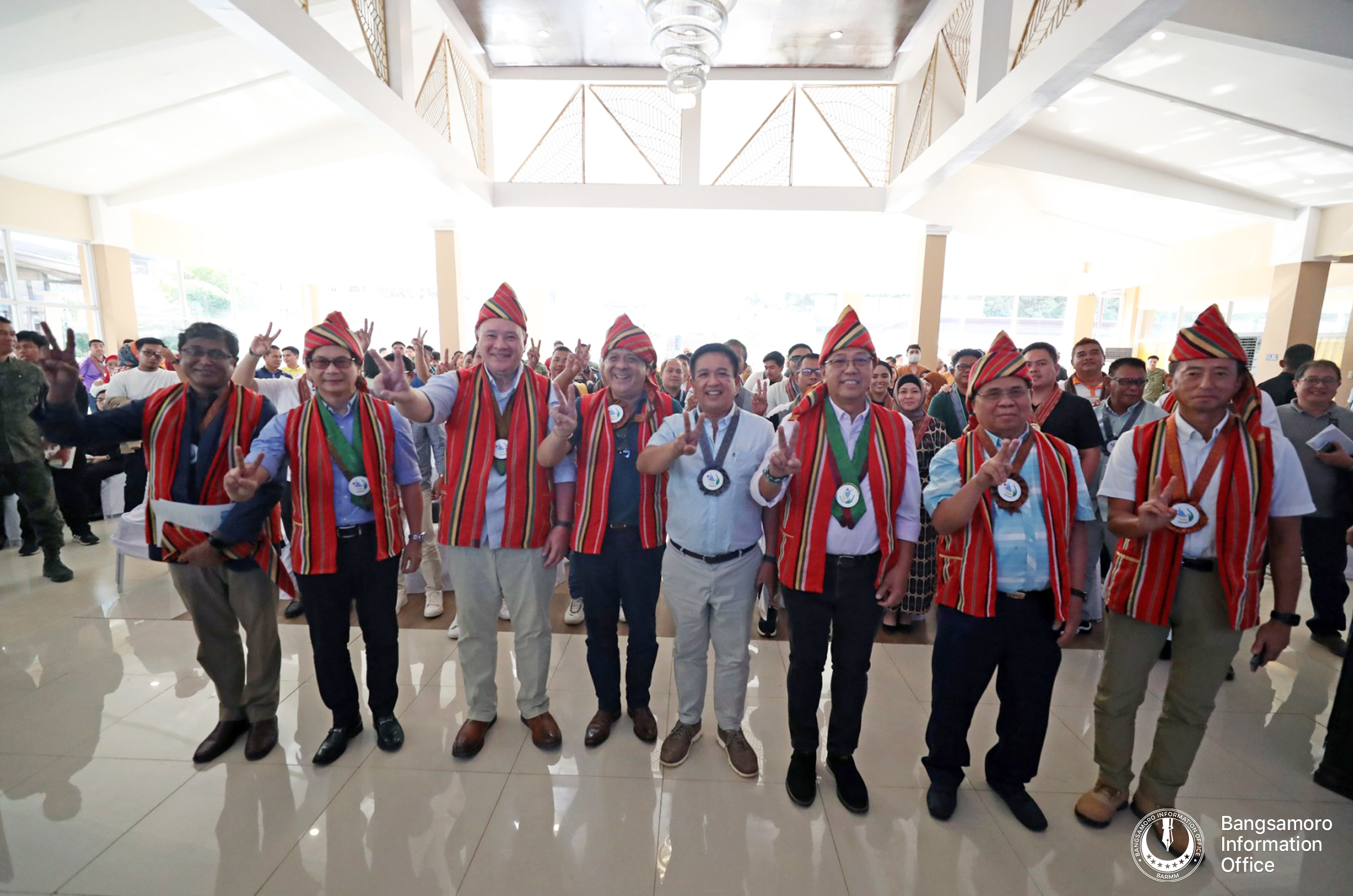
(L-R): UNDP Philippines-Peace and Stabilization Programme Team Lead Dr. Srinivas Kumar, Interior and Local Government Secretary Benjamin Abalos, Jr., National Defense Secretary Gilberto Teodoro, Special Assistant to the President Antonio Ernesto Lagdameo, Jr, Basilan Governor Jim Hataman–Salliman, Presidential Adviser on Peace, Reconciliation and Unity Secretary Carlito Galvez, Jr, Bangsamoro Chief Minister Ahod Ebrahim, and First Secretary of the Political Section of the Embassy of Japan in the Philippines Retired Colonel Michio Suda had their hands up for a peace sign during the ceremonial opening of the ASPIRE Project, or the Assistance for Security, Peace, Integration, and Recovery for Advancing Human Security in BARMM, on October 5, 2023 in Isabela City, Basilan. (Benyamen Cabuntalan/BIO)
COTABATO CITY — In a momentous event held in Basilan on Oct. 5, the United Nations Development Programme (UNDP), the governments of Japan, Philippines, and the Bangsamoro Autonomous Region in Muslim Mindanao (BARMM) gathered to launch the ASPIRE project which aims to end the cycle of violence in the region and throughout Mindanao.
ASPIRE or the Assistance for Security, Peace, Integration, and Recovery for Advancing Human Security in BARMM to address sporadic conflicts caused by private small arms and light weapons (SALWs) in vulnerable communities of the region.
It will be implemented by UNDP-Philippines, with financial contribution worth USD 5-million from the Government of Japan, and was developed through consultations with key stakeholders, including the Office of the Presidential Adviser on Peace, Reconciliation, and Unity (OPAPRU), the Moro Islamic Liberation Front (MILF), and the Joint Normalization Committee (JNC).
Dr. Srinivas Kumar, head of Peace and Stabilization Programme of UNDP-PH, said that ASPIRE is a major step forward for the key stakeholders of the peace process in the BARMM to address the lingering issue and concern of the proliferation of the SALWs using community approach.
“With this project is the commitment of UNDP to continue its overall support to peacebuilding initiatives in the BARMM, maximizing its technical resources and expertise as well as its global experience in peacebuilding including SALW management,” Kumar said.
On the other hand, OPAPRU Secretary Carlito Galvez, Jr. said ASPIRE will work closely with the local government units and the security sector to facilitate the registration and stenciling of loose firearms in identified areas.
The end goal, Galvez said, is to reduce the proliferation of unregistered weapons in communities, which will consequently prevent situation of violence of conflict.
“Basilan was chosen as the pilot area for the roll out of the ASPIRE program because it was the top performing province in the implementation of the SAL-W program. The province, under the leadership of its hard-working Governor Jim Hataman Salliman, has demonstrated its capability to convince its residents to set aside their firearms or give them up in the name of peace,” Galvez mentioned.
In his remarks, BARMM Chief Minister Ahod Ebrahim highlighted the critical role of SAL-W management in post-conflict scenarios, disarmament, normalization, and transitional phases in Southern Philippines. He emphasized that ASPIRE is “not solely about disarmament but is a “profound empowerment initiative that enables individuals to rebuild their lives, actively contribute to society, and become catalysts for positive change”.
“The path to peace and progress is a gargantuan construct, but with the collaborative efforts and understanding of all parties involved, we can pave the way toward lasting peace,” Ebrahim said.
The Chief Minister also extended his deepest gratitude to the UNDP and the government of Japan for their unwavering commitment to social justice in the BARMM.
“I also express our appreciation to the Philippine government for their determination to sustain the dividends of the peace process and provide equal opportunities in the Bangsamoro,” he added.
The reduction and management of SALWs and disbanding of private armed groups (PAGs) are stipulated in the Annex on Normalization as integral parts of the Framework Agreement on the Bangsamoro (FAB) between the Government of the Philippines (GPH) and the MILF.
Given that transitional security is a paramount concern in the implementation of peace agreements, the decommissioning former combatants and the gradual reduction in the prevalence of unregistered firearms will play a central role during the transition period.
Present during the ASPIRE project’s launching in Basilan were First Secretary of the Political Section of the Embassy of Japan in the Philippines, Retired Colonel Michio Suda; National Defense Secretary, Gilberto Teodoro; Interior and Local Government Secretary, Benjamin Abalos, Jr.; Special Assistant to the President, Antonio Ernesto Lagdameo, Jr.; Police Regional Office of the Bangsamoro Autonomous Region (PROBAR) Regional Director, PBGen Allan C. Nobleza; Western Mindanao Commander Major General Steve Crespillo; Basilan Governor Jim Hataman-Salliman; and various mayors in the province.
Also in attendance were Akmad Brahim, co-chair of the Joint Normalization Committee on the MILF side, and Ariel Hernandez, co-chair of the Joint Normalization Committee on the government side. (Norjana Malawi/BIO)







